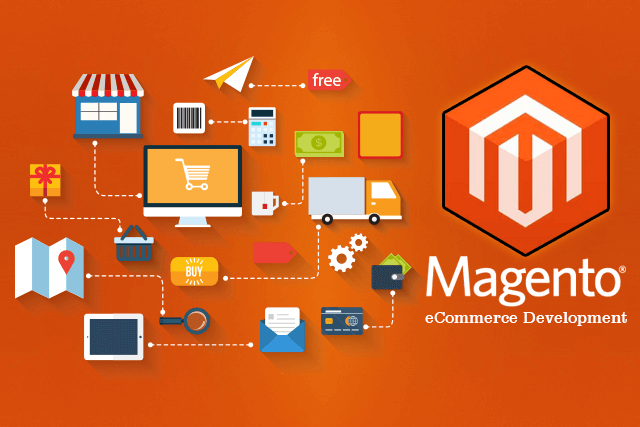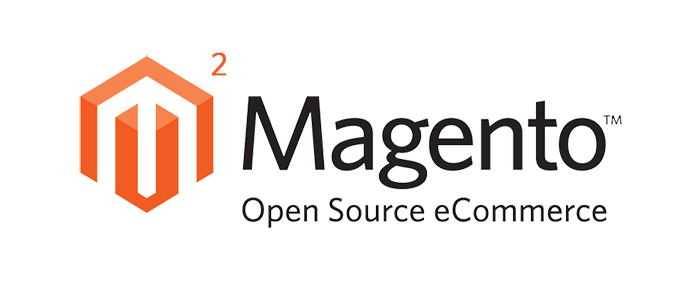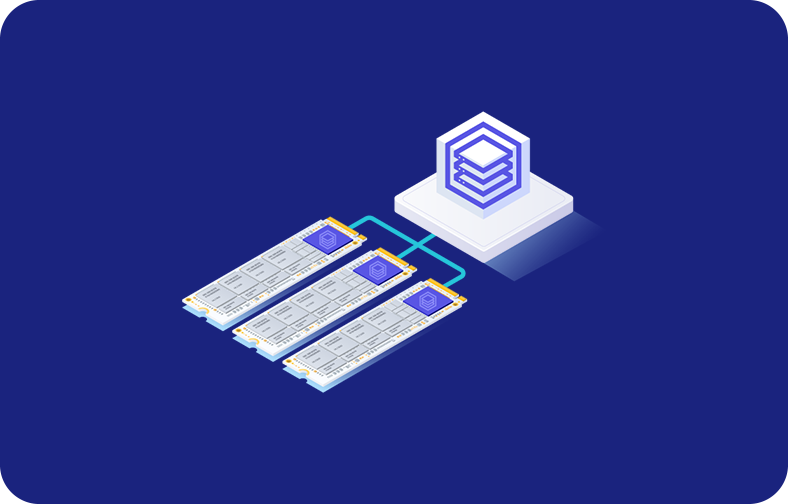Magento: The eCommerce Platform Built for Growth

A dynamic and flexible infrastructure is essential in the ever-changing realm of electronic commerce. Major open-source e-commerce platform Magento enables enterprises across various scales to construct and oversee scalable digital retail locations.
This extensive guide covers every aspect of Magento, including its strategic benefits for organizations seeking to establish a solid online presence, its fundamental functionalities, and its diverse offerings.
-
- What is Magento?
- Magento Open Source vs. Adobe (Magento) Commerce
- What is Magento 2?
- Why use Magento?
- What are Magento’s Features?
- Leverage Magento's Potential with a Scalable VPSServer Solution
With the completion of this article, you will possess the required understanding to determine whether Magento is the optimal platform to advance your e-commerce ventures.
What is Magento?
Magento is an open-source PHP eCommerce Platform. "Open-source" means that the core Magento software is available to everyone for free. This lets developers change and add to its features to meet the needs of individual businesses.
The ability to customize their online stores according to their distinct brand identity and customer experience objectives grants enterprises greater autonomy.
Magento's robust architecture provides an extensive array of functionalities that optimize the administration of online stores. These include but are not limited to inventory control, secure payment processing, product catalog management, robust marketing tools, and built-in SEO capabilities.
By utilizing this extensive collection of functionalities, enterprises can create an online store that is both scalable and loaded with features, allowing it to adapt to the developing needs of the company.
Notably, customization-related expenses might apply although the fundamental Magento platform is provided at no cost for distribution and usage. Potential expenses include web hosting, payments for themes and extensions, and developer fees related to customization.

Magento Open Source vs. Adobe (Magento) Commerce
The community edition of Magento is available for free. You can add more extensions or connectors as needed. It comes with all the features and tools needed for a small business. Additionally, they can construct their solutions or hire a developer for assistance if they are skilled in coding.
Magento Commerce (currently Adobe Commerce) provides paid, enterprise-level eCommerce. Built on the same fundamental technology as Magento Open Source, the current version is one of the Magento eCommerce systems.
The following are the primary differentiations among these offerings:
Magento Open Source
Cost: Download and use are completely free.
Customization: Customization is quite flexible due to its open-source nature. Developers can tweak the core code to meet specific business requirements.
Support: The Magento community provides help through forums, documentation, and developer resources.
Hosting: Self-hosting on a reputable web server is required, which incurs additional hosting and maintenance fees.
Scalability: Scalable, but may necessitate additional development effort to optimise for high traffic levels.
Security: The store owner must take proactive security precautions because automatic patching is not included.
Adobe (Magento Commerce)
Cost: Paid, with annual licensing fees determined by transaction volume.
Customization: Provides a high level of customization via pre-built extensions and functions.
Support: Adobe provides dedicated assistance, resulting in faster response times and expertise.
Hosting: Presented as a cloud-based solution housed on scalable, safe infrastructure under Adobe's management.
Scalability: Extremely scalable and designed to handle high traffic volumes.
Security: Includes automatic security patching and advanced security capabilities to protect your store.
Selecting the Right Option
The best option between Magento Open Source and Adobe Commerce depends on your business requirements and resources. Here is a simple guideline:
-
Magento Open Source: Suitable for startups, small enterprises, or individuals with strong technical skills needing substantial customization.
-
Adobe Commerce: Ideal for established enterprises with significant traffic that require strong security, dedicated support, and a scalable platform managed by Adobe.
What is Magento 2?

Updated from Magento 1 to Magento 2, the latter has more notable features than the former. Certain payment method restrictions, security issues, and a dearth of development assistance might exist. In addition, Magento 1 lacks capabilities provided by rivals, like mobile responsiveness, and has a steep learning curve. It may also experience slowdowns.
Numerous of these problems are addressed in Magento 2's upgraded version. The following are some significant variations between Magento 2 and its predecessor:
-
Supports the newest versions of PHP, which may impact site speed. MySQL, CSS3, and HTML5 are supported.
-
Compared to Magento 1, it speeds up page loads by an average of 20%.
-
Works well on mobile devices.
-
Provides a more pleasant experience for non-technical employees through an improved administrative interface.
-
Reduces the steps required to complete a purchase from six in Magento 1 to two in Magento 2.

Magento 2 Open Source
Magento 2 Open Source continues to function as an unrestricted and participatory platform, as its name implies. Magento's fundamental functionalities are retained, while substantial enhancements are implemented in performance, security, and mobile responsiveness.
This version is designed to accommodate enterprises that desire extensive customization capabilities and management of their online store.
Key Benefits of Magento 2 Open Source
-
It is economical: Operating and downloading it is free of charge, which renders it well-suited for entrepreneurs and businesses on a budget.
-
Extremely customizable: The open-source nature of the product enables substantial customization via extensions and code changes.
-
Large developer community: Takes advantage of a large developer community that provides services for customization, extensions, and support.
Considerations for Magento 2 Open Source
-
Technical competence is essential: Technical knowledge or developer resources are required to customize, maintain, and manage security.
-
Hosting responsibilities: Self-hosting is required, incurring additional hosting and maintenance fees.
-
Limited support: Support is primarily provided through community forums and online resources.
Magento 2 Commerce
Self-hosted, enterprise-grade Magento 2 Commerce is a self-service platform especially tailored for more substantial enterprises that handle substantial traffic volumes and have intricate sales requirements.
Expanding upon the fundamental principles of Magento 2 Open Source, it provides supplementary features meticulously designed to cater to the unique needs of enterprises.
Key Benefits of Magento 2 Commerce
-
Enhanced functionalities: For a complete eCommerce solution, include advanced features like promotions, B2B functionality, and powerful marketing tools.
-
Dedicated support: Provides direct access to Adobe support, resulting in faster response times and experienced assistance.
-
Scalability: Scalability is optimized for huge traffic volumes and product libraries.
-
Security: Security includes automatic security updating and enhanced security capabilities.
Considerations for Magento 2 Commerce
-
Cost: Annual licensing expenses by transaction volume are required.
-
Self-hosting: One must utilize a scalable and secure infrastructure for self-hosting.
-
Technical knowledge: Although the platform provides certain pre-built features, customization may necessitate the involvement of developers.
Magento 2 Cloud Commerce
Providing a completely hosted solution on Adobe's scalable and secure infrastructure, Magento 2 Commerce Cloud expands the functionalities of Magento 2 Commerce. By doing so, organizations can concentrate on their fundamental business activities rather than self-hosting and managing servers.
Principal Practical Benefits of Magento 2 Commerce Cloud
-
Cloud-based: It eliminates the requirement for on-premises hosting, thereby decreasing the expenses and intricacy of IT infrastructure.
-
Scalability: The system exhibits exceptional scalability in managing varying traffic volumes.
-
Automatic updates: The software is updated automatically, and security patches are applied in a managed manner by Adobe.
-
Dedicated support: Access to devoted support provided by Adobe is included.
Considerations for Magento 2 Commerce Cloud
-
Cost: Possibly more expensive than the on-premise alternative, annual licensing fees are calculated according to the volume of transactions.
-
Vendor lock-in: Alternating platforms can be difficult and time-consuming, leading to vendor lock-in.
Magento 2 Edition Selection Considerations
Your company's budget, technical prowess, size, and scalability requirements determine which Magento 2 edition is optimal.
-
Open Source Magento 2 is well-suited for enterprises such as startups, small businesses, or those that possess considerable technical prowess and prioritize extensive customization.
-
Magento 2 Commerce is well-suited for well-established enterprises that handle substantial traffic volumes and demand a dependable hosting platform with enhanced security measures, specialized assistance, and scalability.
-
Highly scalable and fully managed, Magento 2 Commerce Cloud is optimal for established companies that handle substantial traffic volumes and demand a solution with minimal IT intervention.
Why use Magento?
Magento has established a distinct position within the eCommerce store industry through its alluring combination of functionalities and features. The following are some of the most important factors why companies should consider Magento for their online store:
Flexibility and Scalability
Magento is renowned for its resilient architecture, enabling it to effectively support various business scales and product catalogs. Magento can scale to meet the expanding demands of any organization, from a startup with a few products to a multinational corporation with millions.
Moreover, the platform's open-source characteristics, as exemplified by Magento Open Source, enable substantial customization to accommodate your organization's unique needs.
Strong Feature Set
Magento provides an extensive collection of pre-installed features, including but not limited to inventory management, content management, marketing tools, secure payment processing, and search engine optimization capabilities.
By doing away with the requirement for numerous integrations or workarounds, this feature optimizes store administration and ensures a smooth customer experience.
The Open-Source Benefit
Magento Open Source is a financially advantageous option for enterprises that possess a proficient technical workforce or desire extensive customization capabilities.
The extensive ecosystem of extensions and open-source nature enables developers to modify the core code to generate a one-of-a-kind and highly personalized online store experience.
Enterprise-Level Protection
Magento highly emphasizes security, providing consistent security upgrades and robust built-in security features. To ensure the utmost security for businesses, Magento 2 Commerce and Magento 2 Commerce Cloud offer supplementary security features and automatic security upgrades to protect sensitive customer information and financial transactions.
Extensive Developer Group
One of Magento's most notable strengths is its robust community. Thousands of developers contribute to the ongoing development, extensions, and themes that support the platform's expansion.
This dynamic community offers abundant, readily accessible solutions, support forums, and resources to address many business requirements.
Optimization for SEO
Magento incorporates functionalities that optimize product pages, categories, and content for search engines by established SEO principles. This can substantially increase the organic visibility of your online store and attract prospective consumers via search engine queries.
Omnichannel Commerce
By integrating with sales channels, including marketplaces, social media platforms, and physical stores, Magento enables organizations to establish a cohesive omnichannel experience.
This facilitates consumer engagement with your brand through various contact points, promoting brand allegiance and stimulating revenue.
What are Magento’s Features?
With the comprehensive feature set of Magento, organizations can create scalable online stores with abundant features. Let us explore several fundamental functionalities of it:
1. Tools for Promotions, Marketing, and Conversion
Magento allows users to develop a strategic marketing plan and increase conversions by utilizing its integrated suite of tools. A range of coupon formats can be created and administered, encompassing targeted promotions, complimentary shipping, and discounts tailored to particular customer segments.
This adaptability permits the customization of promotions to suit distinct target audiences and campaign objectives. In addition, Magento facilitates email marketing automation, allowing for the scheduling of focused campaigns informed by customer behavior, abandoned baskets, and purchase history.
The utilization of upselling and cross-selling capabilities not only increases the average order value but also augments the revenue potential of consumers through the recommendation of pertinent products.
To optimize the results of your marketing endeavors, Magento can generate personalized landing pages crafted exclusively for lead generation and promotions, thereby facilitating the conversion process.
2. SEO Support
One of the most crucial things to consider for any online business is SEO friendliness when selecting an eCommerce platform. Your consumers are more likely to locate you if you rank higher. Numerous SEO tools included with Magento can assist in increasing your company's visibility in search engine results.
-
SEO-friendly URLs: To maximize the SEO performance, you can build and modify the URLs for every product or category page.
-
Meta tags and descriptions: Magento allows you to customize every item, category, and content page's meta tags and descriptions.
-
XML sitemaps: By automatically creating Sitemaps, Magen helps search engines to efficiently index the pages on the website by providing a comprehensive list of URLs along with the metadata that goes with them.
3. Multi-site Management
While managing multiple online businesses simultaneously may seem challenging, Magento makes it easy. The platform drastically reduces store administration time by enabling you to set up and manage many backends from a single dashboard. This can be accomplished by:
-
Admin Panel: Magento provides an admin panel that functions as the main hub for controlling several stores and websites. You may carry out many site management duties from this Admin Panel, making organizing your store's operations easier and more efficient.
-
Content Management System: Magento has an integrated CMS that makes it simple for retailers to create and alter their stores.
-
Third-party integration: Web Services API facilitates integration with other applications. To enhance the functionality of your store, you are welcome to add any additional features offered by the third-party source. For Magento stores, the possibilities for scaling are endless.
4. Catalog Management
With Magento's comprehensive catalog management tools, your companies can effectively arrange and oversee your product catalogs.
-
Product editing and creation: Magento includes attribute sets that facilitate the rapid construction of various item types. Batch updates to goods are simple to perform through the admin interface.
-
Product types: Magento has infinite product qualities, so your company can add and sell various products. Products can be either simple (single items) or configurable (varying in size or color, for example), bundled (also with varying degrees of customization), or virtual (e.g., software or e-books) and downloaded.
-
Advanced price choices: Magento offers companies a range of customizable pricing options. As a result, different pricing strategies can be used to provide customized pricing for particular clientele.
-
Highly configurable options: Magento gives clients access to many price points tailored to their needs. Watermarking and automated image resizing are also included.
5. Order Management
The order management system offered by Magento eCommerce extensions helps you keep an eye on supply and demand. It's easy to manage your inventory, including returns, even if you have a lot of sales channels and locations. It simplifies inventory control.
This potent Magento feature operates by:
-
Customizing an order: The admin panel allows Magento merchants to see, modify, create, and complete orders. Order details can be changed, including quantities, shipping options, billing addresses, and more. This flexibility allows you to modify orders in response to product availability or cost changes. You may also make changes requested by customers. Identifying and concealing all out-of-stock items is one technique to enhance the shopping experience.
-
Order management across channels: Orders and inventory from several sales channels may be managed centrally with Magento. Regardless of the number of channels you possess, this not only helps to lower the cost of multi-channel administration but also optimizes your order-tracking procedure, leading to more effective order management.
-
Fulfillment of orders and shipping: By generating one or more invoices, deliveries, and credit memos for each order, Magento enables split order fulfillment. Retailers can print shipping labels, invoices, and packing slips, track shipments, and give customers tracking information. This can help your company guarantee accurate and on-time delivery while giving clients access to order status updates.
-
Refunds and Returns: Magento has tools to manage refunds and returns. It is possible to create return requests, oversee authorizations for returns of products, and handle exchanges or refunds. Magento's streamlined return procedure helps you handle client refund orders more effectively, handle them faster, and ultimately increase customer happiness.
6. Payment and Shopping Cart Options
Customers will add your products to their shopping cart after they are done with their order. Customers can save their shopping carts in any Magento business; they will get automated gift messages with every order. SSL security is also used to protect their orders on the front and back end. This has the potential to improve consumer satisfaction while they shop.
When it comes to payments, Magento is likewise well-regarded. It facilitates using many currencies, simplifying the acceptance of various payment methods.
-
Paying with credit cards that have been saved offline.
-
Integration with Authorize.net and several PayPal gateways.
-
Take purchase orders and checks for payment.
-
Magento Connect offers more options for payment extensions.
7. Mobile-friendly
The Magento system offers excellent support for mobile commerce, which is growing in popularity due to the rise in mobile users.
Because Magento supports HTML5, creating mobile-optimized shops is quick and simple. Your store is ready to provide customers with an enjoyable mobile purchasing experience.
This comprises remarkable attributes like:
-
Audio and video media capabilities are unique to a given device.
-
Easy-to-use search and result presentation.
-
Neat presentation of the product description pages.
-
Additionally Magento also supports native Android, iPhone, and iPad smartphone apps.
-
Multiple devices with a single admin panel.
-
Smooth interaction with the CMS, store setups, and product catalog you currently have.
-
Real-time personalization that incorporates retail and promotion updates.
8. Customer Relationship Management
-
Centralized Hub: Gain a complete view of customer interactions through an integrated CRM dashboard.
-
Personalized Marketing: Tailor content and messaging for each buyer journey stage.
-
Seamless Integration: CRM works seamlessly within your Magento admin panel.
-
Wishlist & Reordering: Customer accounts enhance the shopping experience with wishlists, order history, and re-ordering options.
-
Targeted Engagement: Admins can create customer accounts for specific purposes, fostering deeper connections.
-
Effortless Communication: A user-friendly "Contact Us" form simplifies customer inquiries.
-
Centralized Order Management: Create, modify, and track orders from a single location.
-
Real-time Order Updates: Customers can easily monitor their order status with automatic updates.
-
Personalized Emails: Send targeted emails based on the purchase journey, boosting engagement and loyalty.
9. Analytics and Reporting
Any business looking to boost sales and profits needs data and analytics as a foundation. They also need to be appropriately observed. Consequently, the Magento eCommerce intelligence tool is one of the platform's key differentiators.
It offers information about the state of your company, such as:
-
Average order value.
-
Life expectancy of a customer.
-
Customer retention rates.
In addition, its BI tool allows you to display data you can share with your team. You must convert data into useful metrics to help you expand your company; otherwise, raw numbers are not yet information.
10. Extension Availability
Magento uses its vast network of partners and innovators to provide you with a wide range of add-ons and extensions featured on the Adobe Commerce Marketplace besides the pre-installed capabilities.
These add-ons address several aspects of managing your internet business, including marketing, payment and security, customer service, accounting, and finance.
These abundant extension resources add to Magento's high degree of customization, allowing store owners to maximize their establishments' operation further.
Extensions from certified Adobe partners will be made available to you, guaranteeing the product's quality and providing you with a range of pricing options. For other Magento extensions, visit our store if you are a merchant.
Leverage Magento's Potential with a Scalable VPSServer Solution
Run your Magento store at peak performance. Get reliable VPS hosting from VPSServer.com. Our powerful plans with SSD storage and dedicated resources ensure your store loads fast and handles high traffic volumes seamlessly. Focus on growing your business while we handle the infrastructure. Visit VPSServer.com today and experience the Magento performance advantage!
Frequently Asked Questions
Who should use the Magento eCommerce platform?
Magento is an adaptable platform that accommodates organizations of diverse scales. Small businesses and entrepreneurs searching for a scalable and customizable solution supported by a robust developer community will find Magento Open Source an ideal fit. Proficient enterprises that handle substantial amounts of traffic and have intricate requirements can derive advantages from the comprehensive features and specialized assistance provided by Magento 2 Commerce or the entirely managed convenience of Magento 2 Commerce Cloud.
Why do merchants use Magento (Adobe Commerce)?
Merchants favor Magento (Adobe Commerce) due to its adaptability and scalability. It accommodates enterprises of varying scales, accommodating their expansion. Furthermore, the feature-laden platform provides an all-encompassing collection of capabilities directly from the container such as magento ecommerce themes, adobe commerce cloud, magento marketplace and more, thereby obviating the necessity for numerous integrations and optimizing the administration of online stores.
How can a Magento development agency help my eCommerce business versus doing it myself?
An alternative is to get a Magento development agency whose expertise is building Magento eCommerce websites and stores.












